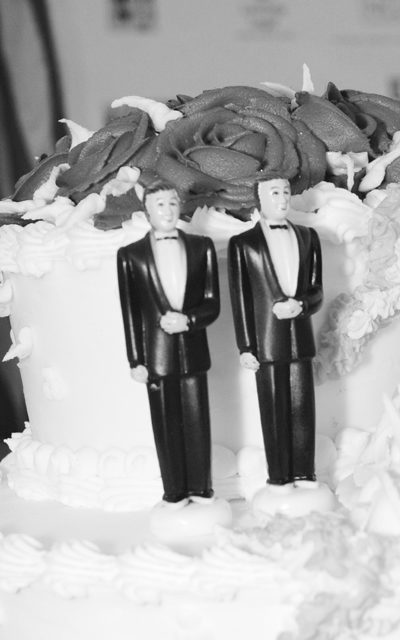In October of last year, Pennsylvania Gov. Tom Corbett commented that same-sex marriage is analogous to incest.
As can be expected, all hell broke loose. His opinion was denounced as “hurtful,” “absurd,” “offensive” and “demeaning.” But few of these criticisms were followed by an articulate, rational explanation of why Corbett’s comments were so absurd and offensive.
In an era where the meaning of “traditional” marriage has been challenged and re-envisioned, it is important to consider the wider implications of our society’s newfound understandings. This means more than offering an emotional response, a gut-urge that something is “yucky” or even “offensive” and instead searching for logical conclusions.
Jessica Gerson of The Huffington Post, defending the validity of same-sex marriage against comparisons to polygamy, pedophilia and zoophilia, establishes marriage as between two human beings, both of whom are adults, wishing to form a mutually consenting relationship. Yet despite the thrust of Gerson’s argument, that legalizing same-sex marriage is not a “slippery slope,” it still seems arbitrary to draw the line at same-sex couples.
What about cousins, for one? Our immediate impulse is prematurely dismissive, gagging at the thought or cringing at the comparison. And yet the dilemma still remains. Cousins, like any human beings, are capable of reaching adulthood, forming mutually consenting, loving, monogamous relationships. For the skeptical, it has been estimated that 10 percent of marriages worldwide are between cousins, and Cousincouples.com estimates the number at 20 percent, with 80 percent of historical marriages, though they operate with a clear bias. Charles Darwin, too, married his first cousin. So did his grandfather. Marriage between first cousins is legal in Canada, most of Europe and 26 states in the U.S.
The most common argument against cousin marriage is an appeal to genetics. Some maintain that for the offspring of such relationships the risk of genetic defect is unacceptable. But, while this argument not only completely ignores sterile and same-sex cousin couples, the risk of significant birth defect in the offspring of cousin couples actually only increases from three to four percent to four to seven percent, according to the National Society of Genetic Counselors. This number is simply not substantial enough to justify banning marriage between first cousins wholesale. If it is, another slew of questions needs to be addressed. Should certain populations more prone to genetic disease be refrained from reproducing? Tay-Sachs, sickle cell anemia, cystic fibrosis – these are just a few of the genetic diseases with ethnic ties. The risk of bearing a child with Down’s syndrome skyrockets from 1 in 1450 to 1 in 30 as a women ages from 20 until 45. Yet few would deny these people the right to procreate, at least not indiscriminately.
In appealing to the genetic argument, opponents of incest who are also proponents of same-sex marriage are forgetting that their definition of marriage no longer includes the ability to produce healthy offspring.
If, then, we as an enlightened society fully legalize marriage between first cousins, even if only between sterile or same-sex couples or even fertile couples after stringent genetic screening, it would still seem arbitrary to limit the right to marriage there. What about sibling marriages? Marriages between parents and offspring? Between aunt and nephew, or aunt and niece for that matter? For Gerson, denying them the right to marriage is denying them their humanity, sanity or mutual consent – granted the consent of the rest of the family might be harder to come by. Of course the genetic risk is much, much greater, but again, there are many cases in which one or both parties are sterile, past the age of childbearing or else otherwise incapable of producing offspring.
Past models of incestuous relationships certainly seem foreboding: sexual abuse, domestic violence and pedophilia are all too often present and will doubtlessly be cited as reason enough to continue the legal and social ban on incest. But there are, understandably hidden, many instances of consensual, incestuous sexual relationships between adults. “You don’t choose who you fall in love with,” says Kathy Hollenbach, happily married to her first cousin. She too thought her spousal situation unusual until her discovery of Cousincouples.com. The fact is, an overwhelming body of human experience persists, showing that loving, consensual, sexual relationships can form. To dismiss them on the basis of their destructive counterparts is to ignore the individuality of involved parties, prematurely denying fundamental human rights.
In a recent debate Lawrence Krauss, an outspoken atheist and a proponent of same-sex marriage, explained that incest wasn’t necessarily wrong: “If you asked me, a priori, if a brother and a sister loved each other and used contraception, is there something absolutely morally wrong with that? … I don’t think there’s any absolute condemnation of that fact, if they love each other and care for each other, and they go off and it doesn’t affect anything else … ” For proponents of same-sex marriage, to simply say that incest is unnatural, barbaric and disgusting is no longer enough – how many times has that language manifested in attacks on same-sex marriage?
Proponents of same-sex marriage rejoice that our society is learning to ignore our emotional impulses and stop appeals to natural order, to forget our adherence to ancient texts, religious traditions and other “antiquated” views.
They claim we are outgrowing our “backward” intolerance for interracial and now same-sex couplings, that we are appealing instead to reason and empathy. Now will we turn around and simply forget these lessons, denying rights proponents of same-sex marriage claim to have made available to all? Is this not, by their modern ideals, a great injustice?
When we watch that scene in Star Wars, where Leah kisses Luke, it makes us cringe: we’ve seen the ending, we know they’re siblings. But if we had that reaction to a gay couple kissing, we would suddenly be shunned as intolerant bigots. It doesn’t add up.
New Hampshire seems already on board on the issue, and is currently considering legalizing civil unions between siblings. As same-sex marriage continues to be legalized across the U.S., the societal certainties of the last century are coming under increasingly critical re-evaluation.
We must begin to ask ourselves, after so much erasing of lines, where the new lines are to be drawn, and why.
Jonathan Warkentine is a College sophomore from Almaty, Kazakhstan.
Photo courtesy of WehoCity, Flickr
The Emory Wheel was founded in 1919 and is currently the only independent, student-run newspaper of Emory University. The Wheel publishes weekly on Wednesdays during the academic year, except during University holidays and scheduled publication intermissions.
The Wheel is financially and editorially independent from the University. All of its content is generated by the Wheel’s more than 100 student staff members and contributing writers, and its printing costs are covered by profits from self-generated advertising sales.







To claim New Hampshire is “already on board on the issue” is hardly truthful. The bill you are referring to failed in the house two years ago. There is nothing current about it. You have also left out the fact that said bill aimed to repeal same-sex marriage in the state.
You are quite right. A serious lack of research on my part.
-Jonathan
The eager focus on setting up your essential “slippery slope” argument is apparent throughout your article. This makes it quite weak even as a piece of amateur journalism. While it is obviously an opinion piece, and not presented as fact, the degree to which you have injected your personal reactions prevents any objective reader from sympathizing with your position at all. Unless you intend to work for one of the fringe sensationalist tabloids, you may want to practice a bit more even-handedness and rationality and less polarization in your future attempts..
Dear reader,
Notice that this is not an argument against same-sex marriage, but an argument for the legalization of incestuous marriage in consideration of current marriage laws. I would like to ask as well for specific instances where I have failed to be rational and even-handed.
Thanks,
Jonathan
Jonathan,
My comments were objective reactions to your piece; I hope you understand them as such. I’ll be glad to give you a more specific analysis, since you ask:
1. In your third paragraph you state that more than an “emotional response or gut-urge that something is ‘yucky’ or even ‘offensive’ is needed, yet two paragraphs latter you state that your “immediate impulse is prematurely dismissive, gagging at the thought or cringing at the comparison.” I think you’re trying to engage your reader in the process that you as the writer were experiencing, but the net effect is that you seem to be ignoring your own advice to be logical rather than emotional.
2. As your data indicate “cousin marriage” while restricted in some US states, is fully legal in more than half of them, legal with restrictions in others, and accepted in most countries internationally, you’re compromising the argument you’re about to make … before you even make it! You’re attempting to equate that with same-sex marriage, a structure that has been, and still is, vigorously restricted world-wide until very, very recently. Frankly, if this comparison is the crux of your article, it fails even more dramatically than I pointed out previously. What you claimed in your comment that you’re arguing FOR is already in place and has been.
3. You make the argument in your seventh (7th) paragraph that somehow same-sex marriages aren’t conducive to “producing” or raising children. Frankly, that is very narrow reasoning at best and intentionally specious at worst. Artificial insemination, surrogate mothers and adoption are a few ways in which same-sex marriages can “produce” children just as any other family unit. If the desired net effect of marriage is children, then your argument fails. (Not to mention that restricting the meaning of marriage only to the “production” of children makes it sound like some kind of “human factory.”
4. Your article uses emotionally-charged terms which leak the innate bias of your article to an objective reader. You have proponents of same-sex marriage “rejoicing” (overstatement to imply overly emotional responses). Then you imply that natural order, adherence to ancient texts, and religious traditions are not really antiquated AT ALL, and by the same means (strategically placing quotation marks to compromise the meaning of certain terms) you imply that intolerance is NOT REALLY backward,
5. You toss in “red herrings” to your argument in odd places, for example paragraph 12, suddenly you’re comparing same-sex marriage to interracial marriage. Why? You haven’t developed any background for how or why interracial marriage would fit into your equation! It’s an oddity, and since it’s quite clear that your position in the piece (and I have no way of knowing if it’s your personal position) is really pointing out the inequity of same-sex marriage, the odd reference to interracial marriage is dissonant, jarring and out-of-place.
6. If as you say the piece is truly intended to ARGUE FOR “cousin marriage” then you needed to take greater care than to refer to it constantly with the negatively-charged terms “incest” and “incestuous” throughout your whole article. Those terms merely reinforce the idea that cousin marriage is somehow unnatural or dangerous and should continue to be restricted.
Hope this helps you Jonathan. This is only one objective reader’s reaction to your article, but if you’re interested in the field of journalism, you’ve got to walk a fine factual, objective and balanced line in your work (and in today’s polarized environment) to avoid sounding merely biased and even smarmy regarding heated topics. Best of luck to you!
Hello,
Much appreciation on my part for your extensive objective feedback. While I’m not actually considering the field of journalism, because I’ve written and published in the Wheel, I will do my best to walk the “factual, objective and balanced line in [my] work.”
1. I think the key word in the 5th paragraph is “prematurely,” which reaffirms what is said in the 3rd paragraph, namely that more than an emotional response is needed. The fact that for many a purely emotional reaction will cut off (as it did with Corbett) any further discussion is, for those supporting the legalization of same-sex marriage, not being fair, considering those who opposed same-sex marriage with similar reactions have been roundly criticized for it. The intention was not to convey or incite feelings, but to continue admonishing readers that while they may have such emotional reactions, they are no longer relevant to the discussion. I do see where you are coming from, however, and in the future will take further pains to distance what I as an author feel on the subject and what the reader feels.
2. Cousin marriage, while technically legal, is still socially shunned, even in places where they have been long been practiced. Similarly, the LGBT community fights not for the legalization of same-sex marriage as much as social acceptance and recognition of those marriages. I’m not just asking why cousin marriage not fully legal in the remaining US States (and indeed, this does not seem to me to be something “strongly in place”); I’m asking why we would deny the social acceptance of such relationships along with their legalization. It is also important to note that I by no means stop at cousin marriage, and that is not the crux of my argument. It is a stepping stone to my next point. If we are to take Gerson’s criteria for eligible marriage candidates, then when we must necessarily consider sibling marriages and other familial combinations we’ve traditionally held as incestuous. I’ve heard some valid arguments against parent-child marriages based on power dynamics, but no one has yet articulated why the positions in the family tree alone should suffice to preclude such marriages.
3. You articulated precisely the argument I made, that marriage is not about producing healthy offspring. As of yet, same-sex couples cannot reproduce in the same way many heterosexual couples can. And yet that inability is in no way supposed to affect the validity of a same-sex marriage. We cannot, then, reasonably deny the validity of incestuous couples’ marriage solely because they can never (or should never) reproduce. While the language should have been less ambiguous, perhaps, “offspring” does denote biological descendancy, which a same-sex marriage, like many close-incestuous marriages, must resort to means outside of the marriage to achieve. This is not to say that same-sex marriages are invalid because of this (plenty of heterosexual couples use surrogate mothers and IVF etc to produce offspring, and there are plenty of sterile heterosexual couples), but just the opposite, and that if we are to be consistent in our new definition of marriage we cannot rightfully withhold it from incestuous couples based only on its ability to procreate.
4. Yes, you hit the nail on the head here; this article certainly suffers from a lot of the emotionalism it indicts. As for quotation marks, they were to emphasize the fact that while many say they have outgrown intolerance, bigotry, and prejudice and have stopped appealing to emotions and the natural order of things, in the case of Gov. Corbett, their reactions prove otherwise. The quotations serve to highlight that hypocrisy, showing that they have not, in fact, outgrown those things and have to fully sever themselves from them.
5. Interracial marriage has often been compared as the forerunner to the same-sex marriage debate. Its reference serves to illustrate a commonly cited progression of enlightenment with enormous inertia that stops mysteriously short before incestuous marriages. Because of the sensitivity of the issue, it is liable to be misinterpreted and is therefore out of place (but so, then, is this entire article, don’t you think?).
6. Good advice.
Thank you for your time and incredibly thoughtful feedback. I hope I have not offended you or anyone else for broaching so indelicately on such a sensitive topic, and likewise wish you the best of luck.
Well-written article. The arguments used in favor of gay marriage can easily be modified to support other forms of marriage. Personally, I agree with the author. Individuals in consensual relationships should be able to marry whomever they want, regardless of superficialities like sexual orientation, race, and age.
Actually, it is a common misconception that people are not allowed to marry based on sexual orientation. While it is predominately the LGBT community that is affected, of course, without the legalization of same-sex marriage no one is allowed to marry someone of the same-sex, regardless of their orientation. For instance, if I am a straight female, I would still not be allowed to marry another straight female (though of course I probably don’t care). Also, I don’t know if I would say the arguments can be modified to support very many other forms of marriage. Polygamy, for example, involves more than two parties.
In summation, take the features you would like to file in your website. The next speed up is to judge a website layout and planning how to arrange